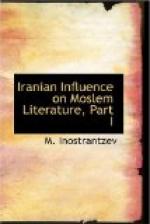Now let us look at the incident of succession. According to the letter Ardeshir did not like to choose his successor lest the latter should wish for his death. So, he arranged for the succession in the following manner. The king only left in his royal letters a few counsels or instructions to the grand Mobed, the commander-in-chief, and the principal secretary, and after the decease of the king the latter were to proceed to elect a successor from among the royal princes. If they all were not of the same mind the choice should rest with the grand mobed alone. But Aideshir had made a formal notes that he was not going to establish a president thereby, and that “in another age a manner of looking at things different from ours may appear the proper one.” In the first place such an arrangement accords ill with the nature of a statesmen like Ardeshir, for we know from Tabari who follows the official chronicle of the times of the Sasanians, that Ardeshir as well as Shapur I and II themselves chose their respective successors. But in the times between Ardeshir II and Kawadh the election of the king was generally in the hands of the noblemen, and the system mentioned by Tansar may well have suited this period and been in harmony with the singular expression ascribed to Ardeshir that the system in question was not a definite one, and that in other periods, other manners might be more convenient. It seems to us that the letter of Tansar was composed at a period when the memory of the system of Ardeshir was still living although it had already been abolished. In other words, it was the time when the kings had gained the power to nominate their successors during their life-time, which brings us to the period between Kawadh and Hormum IV.
The letter makes Ardeshir say “None but the subject kings who do not belong to our House can assume the title of king barring the wardens of the marches of the territory of the Allans and the districts in the west and of Khwarzm.” By the oppression ‘the warden of the matches’ we must understand no doubt the marzbans of the countries established by Khusro.




